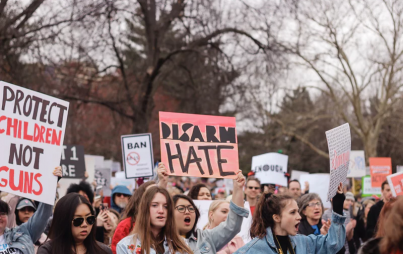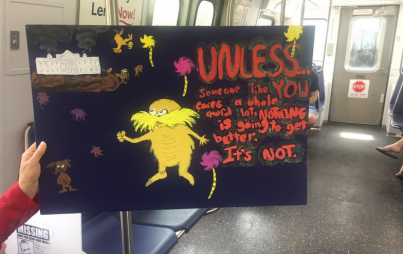
By appealing to a particular brand of “true Texan,”certain Republicans managed to move the party from its business-oriented, pragmatic red-state vibe to a social cause-focused, fundamentalist new version of itself.
There’s a worthy long read in this week’s New Yorker entitled “America’s Future Is Texas.” It’s a supremely in-depth by look by Lawrence Wright at how Texas politics came to be dominated by a Tea Party-esque brand of Republican, with hints of how the Lone Star State’s rightward trending might be reversed. The analysis therein is worth an honest look from any centrist, Democrat, or uber-liberal, so read up.
One anecdote that’s stuck with me is Wright’s recounting of a Democratic state House member who regularly went frog hunting. At night. In shorts and sneakers. With a pistol.
It’s the kind of eccentric story one expects of Texas, and one native Texans are happy to embrace. I’ve lived in Waco, Austin, and now Dallas, and concur as someone not born or bred here that the state exerts a tremendous influence on one’s sensibilities. My first year here, the sound of “y’all” would provoke a troubled half-smile, as I tried to mask the way it made me feel: as though someone had crawled inside my skin and started scratching.
By the year’s end, I was throwing “y’alls” around as if they’d been my lifelong preferred plural pronoun.
Wright’s argument is not that American culture is destined for the language quirks of the second-largest state in the union, of course. It’s that the way super conservative Texas Republicans have taken control of the political agenda could replicate itself on the national scale.
By appealing to a particular brand of “true Texan,”certain Republicans managed to move the party from its business-oriented, pragmatic red-state vibe to a social cause-focused, fundamentalist new version of itself.
It would also benefit Dems to move back from Savage’s wholesale disdain towards rural voters. It’s not only a ticket to permanent minority party status, it’s also just meaningfully off base.
Wright’s behind-the-scenes look at the players in this political shift can be shocking… and depressing. There’s a near fight that breaks out on the state House floor. There’s the spectacle of House members yelling en masse at the state senate, having caught Republican senate leader Dan Patrick taking “their” agenda hostage. There’s the near brawl over funding for a hog abatement problem. (Wild hogs are apparently a real problem in Texas.)
There’s the fact that a bathroom bill hijacked a legislative session, pitting the business-friendly version of Texas against the rising ultra-conservative wing of the party.
In all this drama, Democrats rarely factor at all.
And therein lies much of Wright’s point.
Recently, on Real Time with Bill Maher, “Savage Love” columnist Dan Savage argued that Democrats should forget rural and suburban areas, and focus exclusively on getting their urban voters out to the polls. Essentially, Democrats need to abandon all those parts of the country that don’t already agree with them.
After all, had urban voters turned out, they would have offset rural votes that gave Trump the edge in 2016.
This is true, but it misses a crucial point: holding the presidency doesn’t mean much if the House and Senate are controlled by the opposition party.
Just ask President Obama how effective his last two years in office were, up against Senate Leader Mitch McConnell and House Speaker Paul Ryan. Is Merrick Garland on the Supreme Court? No.
Savage’s strategy of chasing down the Oval Office only, at the expense legislative control, is a dead end.
Moderate Republicans are also facing an extinction-level threat; they’re already a dying breed.
Wright tangentially touches on perhaps the biggest cause of this change: talk radio. Two of those profiled in his piece — senator Dan Patrick and PAC founder Steve Hotze — both got their start in talk radio. And talk radio is like the original Twitter — it awards outrage and scandal, be it manufactured or legitimate, real or “fake.” (Rush Limbaugh would not have survived the past two-and-a-half decades if he lived as irate as he presents to his millions of listeners.)
Fox News quickly followed suit, and the board was set. “True conservatives” were the only ones you could trust. Everyone else was some elitist, big city liberal or RINO, who hated you, who hated the country, and who wanted to line their own pockets and/or transform America from the land of the free to the home of the weak, illegal, and government-dependent.
The only way to combat this is to play the game in the same medium. It would behoove those who aren’t on the Tea Party bandwagon to have an AM talk radio presence. Most Americans are willing to listen to good arguments, especially if they hear them often enough.
If the only voices on talk radio are the Limbaughs and Hotzes, then the fate of Texas seems pretty sealed.
But it would also benefit Dems to move back from Savage’s wholesale disdain towards rural voters. Because it’s not only a ticket to permanent minority party status, it’s also just meaningfully off base.
Case in point: during that first year in Texas, when I — like Savage — had judged the culture here and found it wanting, I used to stop every day at a certain Starbucks. I’d get my venti iced coffee and read classic novels on their patio. One day, a 60-something man approached me. He wore a flannel shirt, tucked into Levi’s, accessorized with a big belt buckle, boots, and cowboy hat.
He said he’d seen me there, reading, and that I had good taste in books. Then he handed me a worn copy of his favorite book — Blood Meridian by Cormac McCarthy. He told me to keep it.
That a rancher could be reading literary fiction came as a shock to me, but I pretty quickly saw that my judgmental attitude said more about me than the reality of this different landscape.
It’s a lesson on Texas that Democrats better learn, too. The sooner the better.







